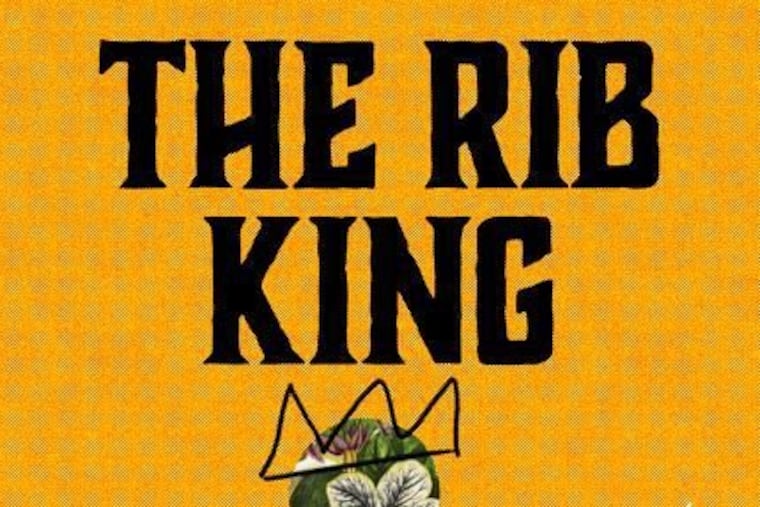‘The Rib King’: A meaty novel about ambition, race and revenge
Ladee Hubbard's second novel upends the racial calculus that amplifies the stories of the privileged few, offering rich, lovingly rendered portraits of working-class Black people.

The Rib King
By Ladee Hubbard
Amistad. 384 pp. $27.99
Reviewed by Naomi Jackson
Ladee Hubbard’s sophomore novel, The Rib King, is a fascinating story about the intersection of ambition, race, and revenge. The book opens in 1914 in a mythic Northern city reminiscent of Chicago and follows the fortunes of the Black servants for the white Barclay family. The first section is narrated by Mr. Sitwell, a longtime groundskeeper and newly minted butler for the Barclays who later becomes the face of a popular meat sauce. Sitwell’s decision to settle scores after reading a fictional account of the events that orphaned him and jettisoned him from his beloved rural Florida community at just 12 years old sets the rest of the book’s events into motion.
The Rib King upends the racial calculus that amplifies the stories of the privileged few, offering rich, lovingly rendered portraits of working-class Black people. Hubbard’s work underscores the legendary Toni Morrison’s words in the New Yorker: “You are not the work you do; you are the person you are.”
Hubbard’s novel is a powerful meditation on the way that Black women’s hopes and fortunes were (and still are) constrained by racism and misogyny. Mamie Price, the Barclays’ cook, is a woman whose ingenuity and artistry far surpass the circumscribed opportunities available to her. Jennie Williams, another domestic worker for the Barclays, eventually discards a life marked by abuse and remakes herself into an inventor and entrepreneur, outmaneuvering gangsters, activists, and white businessmen alike.
While The Rib King is set in the early 20th century, the questions it raises are deeply resonant today. Among them: What if African Americans responded to the profound violence leveled against them with vengeance instead of nonviolence? Sitwell awakens from a kind of servile slumber and heeds a call to action: “I have always known I owe my people something. For a long time, I thought what I owed them was to simply survive. ... But it occurs to me that perhaps this life, this world demands more of me. Perhaps the only way to ensure that the truth is what prevails is to make sure there is no one around to tell these lies.”
The Rib King reminds readers that people are not always as they seem and that buried just below the surface of obsequiousness may be a thick layer of malice and an unquenched thirst for revenge. This novel is in conversation with Asali Solomon’s 2015 book, Disgruntled, which explores the life of the Black butler with roots in Barbados who burned down Frank Lloyd Wright’s estate.
The Rib King underscores the necessity of revisiting the violence that has been done to African Americans and the ways that language falls short of fully capturing its magnitude. Hubbard interweaves the macabre backstories that drive each of the Black characters up north, rendering the dark side of the Great Migration. Bart, an orphan who works in the Barclays’ kitchen, speaks poignantly of trying to leave his painful past behind: “I remember. Just don’t like talking about it. The toes are gone and talking about them is not going to bring them back. ... It’s not the only mark on me, you know. Just the one you’ve seen. But I got plenty of marks. You want me to show them to you, all the other places I been cut up, tell you about them too?”
The novel also explores whether anyone is truly who they seem to be, and moreover, whether people can truly know themselves and their intentions. Hubbard's characters and their stories suggest that we are both less and more terrible than we think, and that our view of events directly correlates to our role in them. Hubbard describes Jennie's longing to know what lurks beneath the facades of her fellow city dwellers: "People laughing and singing or sulking and frowning and all of them in a hurry to get somewhere. But who were they really? Who knew what any of them were actually capable of?"
Hubbard crafts unforgettable characters and masterfully builds suspense. The author also deftly deploys the frame story, putting the present narrative in conversation with the violent events of Sitwell’s childhood in the American South. Sitwell’s intense reaction to the fictional retelling of his primal loss reminds readers that history belongs to those who control its narrative, and that fiction can be as powerful, and in some cases even more influential, than fact. While there is much to enjoy in The Rib King, the ending goes off the rails a bit, with too many minor characters and plot points introduced too swiftly. Among the fascinating characters who go underexplored are the Harperites, an activist group that recalls the legacy of Marcus Garvey and the contemporary Black Lives Matter movement.
The Rib King will resonate with readers who are interested in African American history and literature, and with those who want to interrogate the emblematic American myths of progress and individual uplift. The novel weighs questions that are central to human experience: how to live in trauma’s long shadow, the value and perils of vengeance, and the (im)possibility of ever fully knowing both others and ourselves.
Jackson is the author of “The Star Side of Bird Hill” and an assistant professor of English at Rutgers University-Newark. She wrote this review for the Washington Post.